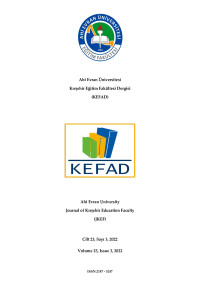A Review of the Products Created by Pre-service Teachers in the Online Basic Design Class and Their Opinions Related to the Process
Öz
In this study; Within the scope of Basic Design II Course, which was held online (remotely) during the COVID-19 Pandemic process, it was aimed to determine the students' feelings and thoughts about the course process. In this context, students were given individual project work on "collage". At the end of the project work, the experiences, feelings and thoughts of the students regarding the process were determined and the products they created were evaluated by three different field experts in terms of visual design elements and principles. Project work; Basic Design II Course was carried out on three dimensions: Project Based Learning and Online Education. The study group consists of 29 pre-service teachers who took the first-year Basic Design II course from the Faculty of Education, Fine Arts Education Department of a state university located in the Mediterranean Region. Implementation work continued for six weeks in the spring semester of the 2019-2020 academic year. The project work consists of three stages: "Identification of Subjects, Creation of Project Plans, and Implementation of the Project". While the lessons were held online (remotely), on the other hand, individual or group lessons were continued via WhatsApp and e-mail. In the study, the mixed method, in which qualitative and quantitative research methods are applied together, was used. "Visual Arts Class Product Evaluation Form (Result "Holistic Rubric" Scoring Directive) consisting of seven items and five dimensions in the collection of quantitative data, and the "Opinion Form" consisting of ten semi-structured open-ended questions were used as data collection tools in the collection of qualitative data. In the analysis of the quantitative data of the research, the Kruskal Wallis H test was applied on the scores the students got from the products (collage). Then, multiple comparisons were made by applying the Man Whitney U test to determine the significant differences between the experts. In the analysis of qualitative data, content analysis was applied to the answers given the opinion form. As a result of the analysis; depending on the codes, paper, waste material, paint, due to the subject, easy access, material shortage, preference, psychological problems due to the epidemic, problems due to academic inadequacy, family problems, computer and internet related problems, big city, district, village. has been reached.
Anahtar Kelimeler
Basic Design II Class Project-Based Learning Online Education Collage Basic Design II Class, Project-Based Learning, Online Education, Collage,
Kaynakça
- Yılmaz, M. (2006). Modernizmden Postmodernizme Sanat. Ed. N. Yılma, Ütopya Yayınevi. ISBN: 975-6361-34-4
- Yurdakul, B. (2010). Uzaktan eğitim. Editör: Özcam Demirel. 4. Baskı. Eğitimde Yeni Yönelimler. A Pegem Akademi
Çevrim İçi Gerçekleştirilen Temel Tasarım Dersinde Öğretmen Adaylarının Oluşturdukları Ürünlerin ve Sürece Yönelik Görüşlerinin İncelenmesi
Öz
Bu çalışmada; COVID-19 Pandemi sürecinde online (uzaktan) olarak gerçekleştirilen Temel Tasarım II Dersi kapsamında öğrencilerin özgün ürünler oluşturmaları ve ders sürecine yönelik duygu ve düşüncelerini belirlemek amaçlanmıştır. Bu kapsamda öğrencilere “kolaj” konulu bireysel proje çalışmaları yaptırılmıştır. Proje çalışmasının bitiminde öğrencilerin sürece yönelik deneyim, duygu ve düşünceleri belirlenmiş ve oluşturdukları ürünler üç farklı alan uzman tarafından görsel tasarım öğe ve ilkeleri yönünden değerlendirilmiştir. Proje çalışması; Temel Tasarım II Dersi, Proje Tabanlı Öğrenme ve Online Eğitim olmak üzere üç boyut üzerinde gerçekleştirilmiştir. Akdeniz Bölgesinde yer alan bir devlet üniversitesinin Eğitim Fakültesi Güzel Sanatlar Eğitimi Bölümü birinci sınıf Temel Tasarım II Dersini alan 29 öğretmen adayı çalışma grubunu oluşturmaktadır. Uygulama çalışması 2019-2020 eğitim-öğretim yılı bahar döneminde altı hafta boyunca devam etmiştir. Proje çalışması “Konuların belirlenmesi, Proje Planlarının Oluşturulması, Projenin Uygulanması” şeklinde üç aşamadan oluşmaktadır. Dersler online ortamda (uzaktan) gerçekleştirilirken diğer taraftan WhatsApp üzerinden ve mail yoluyla bireysel veya grup olarak derslere devam edilmiştir. Çalışmada nitel ve nicel araştırma yönteminin birlikte uygulandığı karma yöntemden yararlanılmıştır. Nicel verilerin toplamasında yedi madde ve beş boyuttan oluşan oluşan “Görsel Sanatlar Dersi Ürün Değerlendirme Formu (Sonuç “Holistik Rubrik” Puanlama Yönergesi) ” nitel verilerin toplanmasında ise on adet yarı yapılandırılmış açık uçlu sorudan oluşan “Görüş Formu” veri toplama araçları olarak kullanılmıştır. Araştırmanın nicel verilerinin analizinde öğrencilerin ürünlerden (kolaj) aldıkları puanlar üzerinde Kruskal Wallis H testi uygulanmıştır. Daha sonra uzmanlar arasındaki anlamlı farklılıkların belirlenmesine yönelik olarak Man Whitney U testi uygulanarak çoklu karşılaştırma yapılmıştır. Nitel verilerin analizinde görüş form verilen cevaplara içerik analiz uygulanmıştır. Analiz sonucunda; kodlara bağlı olarak kâğıt, atık malzeme, boya, konu gereği, kolay ulaşım, malzeme yetersizliği, tercih, salgına bağlı psikolojik problemler, akademik yetersizliğe bağlı problemler, ailevi problemler, bilgisayar ve internete bağlı problemler, büyük şehir, ilçe, köy, şeklinde ondört temaya ulaşılmıştır q
Anahtar Kelimeler
Temel Tasarım Dersi kolaj proje tabanlı öğrenme Temel Tasarım Dersi, kolaj, online eğitim, proje tabanlı öğrenme, çevrim içi eğitim
Kaynakça
- Yılmaz, M. (2006). Modernizmden Postmodernizme Sanat. Ed. N. Yılma, Ütopya Yayınevi. ISBN: 975-6361-34-4
- Yurdakul, B. (2010). Uzaktan eğitim. Editör: Özcam Demirel. 4. Baskı. Eğitimde Yeni Yönelimler. A Pegem Akademi
Ayrıntılar
| Birincil Dil | Türkçe |
|---|---|
| Konular | Alan Eğitimleri |
| Bölüm | Araştırma Makalesi |
| Yazarlar | |
| Yayımlanma Tarihi | 31 Aralık 2022 |
| Yayımlandığı Sayı | Yıl 2022 Cilt: 23 Sayı: 3 |

